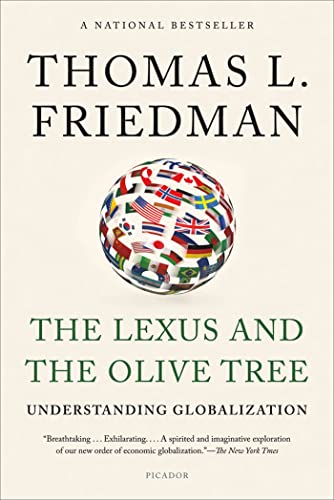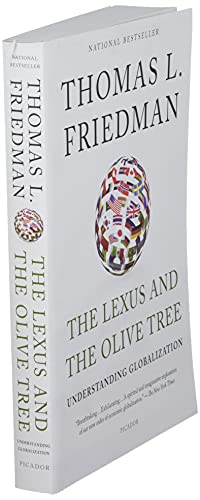Customer Services
Copyright © 2025 Desertcart Holdings Limited





The Lexus and the Olive Tree: Understanding Globalization
W**H
american view of the world
Friedman succeeds in explainings the whys and the hows of today's complex interaction of financial, political, technological and scientific values. this book is a must read for all those who feel unconfortable with the "no-global" thesis but search for words. Unfortunately I have to notice two let downs. Mr Friedman's vision of the world is surprising america-centric for a man who has travelled so much. Yet again here we find a Yank who feels he has the right to put his model on top of all others and judge the rest of the world. Well, he's right on most of his conclusions but we'd all rather like it to be expressed with more care. Clearly the book has been written with american readers in mind and provides them with the ever needed holliwood-style pat on the back. The second really unfortunate thing is that the Anchor edition paperback has litterally fallen into pieces by page 100 and I have had to keep track of all the loose pages for the duration of the book. Pity.
S**S
"No one is in charge!"
Those fearing this book is a treatise in economics, take heart. Lexus isn't about numbers or the arcane world of international banking - it's about attitude. If your attitude is open to global thinking, untrammelled by tradition or restrictive cultural ideas, you will surely succeed in improving your lifestyle. If you hold too tightly to traditional ideals, you will just as surely fail. Either way, you'd best buy, read, and understand this book. Friedman's analysis conveys the thinking of too many people. You cannot afford to ignore it.With evangelical fervour, Friedman explains how the end of the Cold War unleashed American capitalism around the globe. While "free market" capitalism had been a weapon in those years of missile diplomacy, the breakup of the Soviet Union left the American economic model without a major opponent. The collapse of the Berlin Wall, coinciding with the rise of the high speed digital communications, led to a new era of global finance. Once, "the sun never set on the British Empire." Now the Internet allows investment activity continuously and without hindrance. The market is never closed as international financial transactions occur constantly, and at light speed. And the market is open to anyone wishing to participate. Anyone possessing the resources, that is.Friedman argues that the American model of capitalism is the ideal version. Government must play a minimal role. "No one is in charge" simply means no overseer to represent the community's interests. Labour unions are to be quelled. No favours are to be shown to any not meeting the new performance standards. The "wounded" firm must be killed off to allow the successful to continue. There will be disruptions in peoples' lives, but emerging new businesses will pick up any slack. The reward will be growth and enhanced living standards. The system is so well established now, according to Friedman, that it can, is and will be exported successfully around the planet. Anyone it touches need only accept it without question.Global acceptance, of course, is the rub. The world isn't [yet] American. Scattered around our planet are numerous cultures who either haven't seen the light or resist its premise. These are the peoples who cling to their "olive trees" in defiance of Americanization. Friedman recognizes their concern over losing what they feel is valuable. He should, his interviewees have told him so often enough. He doesn't want them subjugated to an American ideal, he wants them to buy into the system voluntarily. Many want what the new economic system offers, he stresses. They simply have to learn how to adjust their values enough to bring America's financial methods into their own culture. How are they to achieve this feat? Replace restrictive or unresponsive governments. How this is to be achieved in the face of the pace of globalization is left unexplained.Friedman's eagerness is contagious. It seems cruel to refute a man who presents his case with such honesty and in such a readable style. He carries you along with finesse and you have no feeling of being duped by someone so forthright. He wants everybody to accept his assertions because he sincerely believes those who do will benefit from the new economics. He addresses every objection, meeting each head-on with convincing arguments. He admits, for example, that not everyone has access to the digital communications making globalization possible. Easily solved, he says. One cell 'phone per village is a good start. Even the environmental concerns are [very briefly] touched - conservationists adopting capitalist tactics will save the rain forest. I'm not making this up! He means what he says.What he fails to recognize is that high speed communication, instantaneous finance and rapid economic growth carries an exacting price. Consumption at the American pace over the whole planet means production to meet the demand. That level of production is reflected in the inroads being made on the world's resources. The pace of growth is faster than "environmentalists" can cope with. Environmental issues are brought to view only when it's too late. If people sit back, allowing unfettered capitalism to buy off their future, there won't be a world left for enjoyment of that enhanced lifestyle. Friedman rejoices in the assertion that "no one is in charge" because it means no fetters to American capitalist ideals. That lack of control may sound the knell of the ideal. Capitalism, as a philosopher once noted, carries the seeds of its own destruction. Sprouts from those seeds may be found in Mark Hertsgaard's "Earth Odyssey." Read Friedman, then immediately take up Hertsgaard. Only then can you realistically assess your own attitude. [stephen a. haines - Ottawa, Canada]
D**S
Essential reading
Globalization is a new international system with its own rules of logic, pressures and incentives that influence politics, environment, business, and economics in virtually every country; it is the dominant world system that shapes everything else. The new rules are so different from what has gone before and the different threads are intertwined in such a complicated manner that few understand them. Who would have thought that the 1997 collapse of the Thai currency would ultimately lead to the collapse of Long-term Capital Management in the US where two economists had won the Nobel Prize the previous year for their contribution to managing risk? The global market place has become an electronic herd of anonymous traders and investors connected by screens and networks; a herd that knows only its own rules and that will crush any one - and even governments - that stand in its way. Globalization is not a choice but a reality, but the problem is that no one is in charge.Globalization is not new. Round I of globalization took place before World War I and was founded on cheap transportation. There was a period of relative calm until the fall of the Berlin Wall and the collapse of communism triggered Round II which is founded on cheap telecommunications. We can now reach further, faster, cheaper and deeper than ever before. Previously non-tradable services such as accounting, telephone answering and engineering design can now be transferred to low wage countries; production, research and marketing can be located where strategically most advantageous. The Berlin Wall did not just fall in Berlin; other walls came down in other countries at roughly the same time. Three changes caused the walls to fall - how we communicate, how we invest and how we learn. These changes allowed Thailand to move from being a low wage rice producer to the world's second largest producer of pick up trucks and the 4th largest manufacturer of motor cycles in 15 years. These changes give individuals more power to influence markets and nation states than at any time in history - as occurred when investors brought down Indonesia's Suharto in 1998. These changes allowed Jody Williams to win the 1997 Nobel Peace Prize for an international ban on land mines by organizing human rights groups by e-mail. These changes allow us to tune into almost any public or private TV station worldwide so we can now see and hear through almost every conceivable wall. These changes allow a company like Cisco to close its books within an hour and to operate without paper. Lexus in the title stems from a visit to a Toyota car factory where 66 people and 310 robots produce 300 Lexus sedans daily. Lexus represents our drive for improvement, prosperity, modernization, and innovation. The Olive tree stands for stability, family values, and a sense of belonging. The anonymous, transnational, homogenizing, standardizing forces of the Lexus are the biggest threat to the olive tree. Our challenge is to find a healthy balance between the two while recognizing that competitive pressures oblige us to build a bigger and better Lexus every day. Globalization can be likened to a race that you have to run day after day after day. However many times you win, you still have to run again next day. If you lose by a fraction of a second it is as though you lost by an hour. By just entering the race you threaten the very existence of your own olive tree. By not entering the race you may not even be around to enjoy your olive tree.We cannot hope to understand and manage globalization without reference to all its components and how they interact with each other. Friedman has provided us with a guidebook giving the various components of globalization and suggestions on how we might go about managing globalization. This book is essential reading whether you want to be a Lexus or an olive tree.
A**R
Light reading
Light reading, but ultimately anecdotal and written from one of the winners in a system creating many more realtive, if not absolute losers. Friedman is a bourgeois journalist writing up his day in the jetset, thats about it.Worth reading along with Klein's No Logo since they are both emotive and polemical, choose a side, but if you want to even begin to understand Klein or Friedman are only starting points on a long journey.
Trustpilot
2 months ago
3 days ago